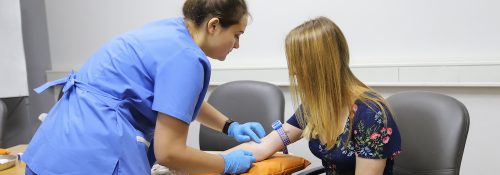Vital Elements to Consider When Picking the Many Appropriate Medical School Educational Program for You
Selecting one of the most fitting clinical college curriculum is a critical decision that can significantly influence your academic journey and future profession path. As striving doctor, the selection of educational program should straighten with your individual learning style and career desires. However, beyond these initial considerations, numerous vital aspects enter play when making this choice. By checking out the nuances of training methods, educational program adaptability, and medical direct exposure possibilities, a more extensive understanding of what makes a curriculum appropriate for you emerges. Let's discover these critical aspects that can form your clinical education and inevitably, your specialist trajectory.
Personal Knowing Style

Medical colleges that supply varied training methods and sources can accommodate numerous finding out designs, promoting a inclusive and dynamic instructional environment. Ultimately, recognizing individual knowing choices equips trainees to make educated decisions concerning their clinical education, establishing a strong foundation for their future occupations in healthcare.
Occupation Purposes Positioning

Additionally, lining up job objectives with the clinical school educational program can also boost inspiration and interaction throughout the instructional trip. They are extra likely to remain specialized and concentrated to their research studies when pupils see the straight relevance of their coursework to their future career. Therefore, when picking a medical college curriculum, it is crucial to thoroughly take into consideration exactly how well it straightens with one's job objectives to make certain a successful and meeting professional path.
Training Approaches
Taking into consideration the positioning of profession goals with the chosen medical school educational program, an examination of the teaching methods used becomes important fit the learning experience. The effectiveness of a medical school educational program heavily depends on the training approaches made use of by the institution. Different mentor techniques, such as talks, little group discussions, problem-based understanding, simulation-based training, and hands-on clinical experience, can significantly affect how well students comprehend and retain info.
Lectures are a traditional however still frequently used method for supplying content to a huge team of trainees successfully. Small group conversations foster collaboration, essential thinking, and interaction abilities among pupils. Problem-based understanding encourages energetic involvement, self-directed knowing, and analytical abilities. Simulation-based training enables pupils to practice clinical skills in a controlled atmosphere prior to connecting with actual clients. Hands-on clinical experience offers a direct understanding of patient care and medical methods.
When choosing a medical school educational program, aiming pupils must think about the mentor methods used to make sure that their knowing preferences and staminas straighten with the instructional strategy of the institution.
Educational Program Flexibility
When assessing clinical college programs, evaluating the extent of curriculum adaptability is crucial for potential pupils seeking a tailored academic experience. Curriculum adaptability refers to the level to which pupils can personalize their knowing courses within the clinical college curriculum. A More Info curriculum that supplies versatility enables trainees to seek their passions, focus on locations where they need extra assistance, and participate in learning experiences that align with their profession goals.

Possible medical pupils must think about how a clinical institution's curriculum versatility straightens with their discovering preferences, profession goals, and personal goals. By choosing a program that offers the appropriate equilibrium of structure and adaptability, students can enhance their instructional experience and prepare themselves for effective occupations in medicine.
Clinical Exposure Opportunities
Exploring the functional application of clinical understanding, clinical direct exposure opportunities play a critical duty in forming a detailed medical education and learning. These opportunities supply trainees with important hands-on experience in resource real healthcare settings, allowing them to link the space in between concept and method. When considering clinical school curricula, the quality and quantity of medical direct exposure need to be very carefully assessed.
Efficient professional direct exposure must offer a diverse variety of experiences throughout different specialties, guaranteeing that pupils are revealed to different clinical circumstances and individual demographics. Exposure to outpatient facilities, inpatient wards, medical movie theaters, and emergency situation departments can help trainees create an all-round understanding of various elements of healthcare distribution. In addition, chances for community-based care and interactions with underserved populations can cultivate a deeper admiration for the social components of health.
Moreover, the presence of encouraging faculty and coaches during these professional experiences can dramatically improve the learning procedure. Faculty support and positive feedback can aid students assess their medical encounters, determine locations for improvement, and boost their scientific abilities and decision-making capabilities (Northeast Medical Institute CNA Classes Near me Stamford). On the whole, robust professional direct exposure possibilities are necessary for preparing future medical professionals to provide quality client treatment important site efficiently
Verdict
To conclude, when picking a medical college curriculum, it is important to consider your individual knowing style, placement with profession goals, instructing approaches, curriculum adaptability, and professional direct exposure chances. These elements play a critical role in determining the most appropriate program for your expert and educational advancement. Make certain to extensively evaluate each aspect to make an informed decision that will certainly best support your development in the clinical field.
Comprehending one's individual discovering design is essential when selecting a medical institution curriculum. By recognizing one's discovering design early on, striving medical students can strategically choose an educational program that caters to their staminas, eventually improving their discovering experience and scholastic success.
When assessing medical school programs, examining the degree of educational program flexibility is essential for potential pupils seeking a customized educational experience. Educational program adaptability refers to the degree to which trainees can personalize their learning courses within the medical school curriculum.In conclusion, when selecting a clinical school educational program, it is necessary to consider your individual discovering style, placement with career goals, teaching methods, educational program adaptability, and scientific exposure opportunities.